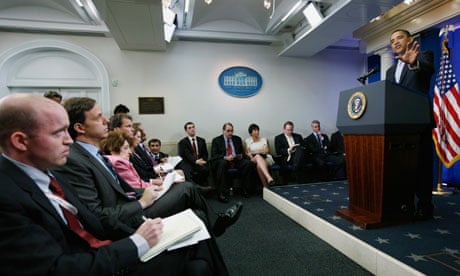News organisations in the US are reviewing their policies on quote approval after the New York Times blew the whistle on the draconian methods deployed by campaign officials to control their media messages.
The New York Times and the LA Times have confirmed to the Guardian that they are reviewing the practice of allowing reporters to submit quotes for approval by the Obama and Romney camps before publication.
Reuters said it opposed the "wholly unacceptable" practice, as did the Associated Press. Web publisher Buzzfeed said it tried to avoid it, and RealClearPolitics said it was discussing the issue with staff.
The pushback on quote approval followed a front-page article in Monday's New York Times, revealing that the Obama and Romney campaigns frequently insist on reading and redacting quotes given by interviewees before permission is given to publish.
The Times article said reporters were being granted interviews with officials from the Obama campaign "under one major condition: the press office has veto power over what statements can be quoted and attributed by name". The report added that Romney advisors "almost always require that reporters ask them for the green light on anything from a conversation that they would like to include in an article".
In the article, the Times's managing editor for news, Dean Baquet, said he disliked quote approval. "We encourage our reporters to push back. Unfortunately, this practice is becoming increasingly common, and maybe we have to push back harder," he said. A spokesman confirmed on Tuesday that a review was under way.
Asked if the Los Angeles Times was planning to review its guidelines, a spokeswoman told the Guardian: "I can confirm that it's a topic of discussion."
The Washington Post's national editor, Kevin Merida, said that the paper's political staff "aggressively pursues on-the-record information and quotations in reporting on the campaigns".
"In dealing with sources, we trust our reporters to make decisions that uphold the Post's high journalistic standards, and are in the best interests of our readers," Merida said.
Buzzfeed's editor-in-chief Ben Smith told the Guardian he had sent a memo to his reporters in the wake of the Times report. "I did send a note to staff that we should avoid quote approval if possible, and if it's not possible, to make sure we're transparent with readers about having done it.
"We have done it on a couple of occasions this year with officials from both campaigns. I'm generally of the view that reporting is a complicated and imperfect practice and not well-suited to bright-line rules."
Barb Burg, a spokeswoman for Reuters, said that the news agency was not reviewing its policy, but was opposed to the practice. "Except in rare instances that specifically further accuracy and comprehensibility, Reuters regards the practice of letting sources approve and materially change quotes as wholly unacceptable," she said.
Carl Cannon, Washington editor of RealClearPolitics, said on Tuesday that while the organisation has only used quote approval infrequently, they were planning to "discuss it as a staff this week to make sure we're comfortable with what we're doing".
He said the practice of quote approval "isn't really new to Washington reporting, but it's apparently been institutionalized by the Obama campaign to a degree that is troubling".
Cannon said that the practice has grown out of reporters interviewing a source "on background", then running an on-the-record quote past them for clarity – something reporters have traditionally been happy to do, but that has seemed to have been "abused" by campaign officials.
Jay Rosen, professor of journalism at New York University, agreed that "this is not a new problem", but said it had got worse.
"There have always been sources that tried to win these terms, and lately more and more have succeeded. What was new and significant in the Times story was that quote approval is now the norm for a whole layer of campaign sources; most of the reporters working the beat had already come to terms with that, the Times suggested."
Rosen said that reporters told him that the process has been building for years under George Bush and now Barack Obama. It has been allowed to happen, he said, because of "what academics call the collective action problem".
"The press can behave as a crowd of independent minds, but it has problems acting as an united front on anything," he said.
Asked what it would take to reverse the trend of quote approval, Rosen said: "A press willing to say: 'Fine: we'll report the story around you. We will build it from the outside in.'
"'We'll call you for comment, but our base line assumption will be that you will issue only the most predictable and mundane statements.'"

Comments (…)
Sign in or create your Guardian account to join the discussion